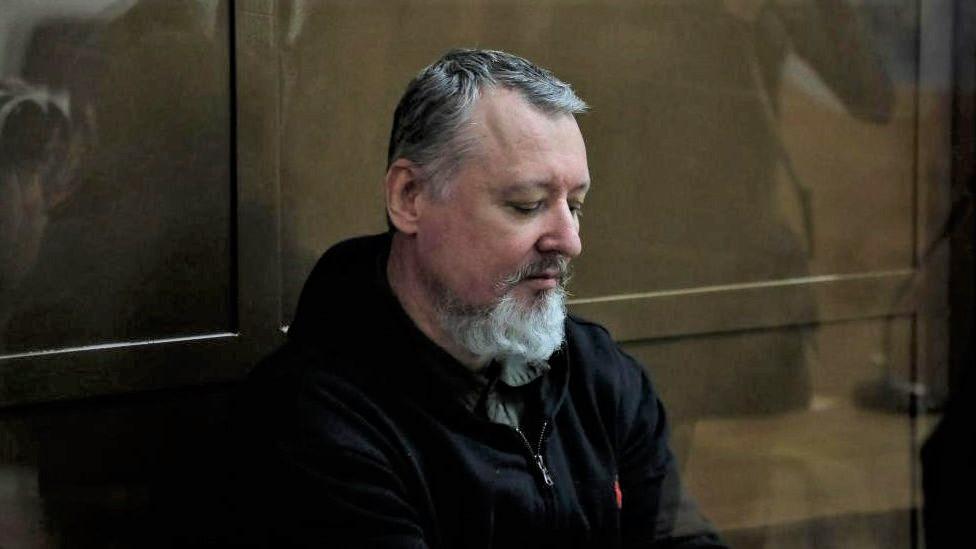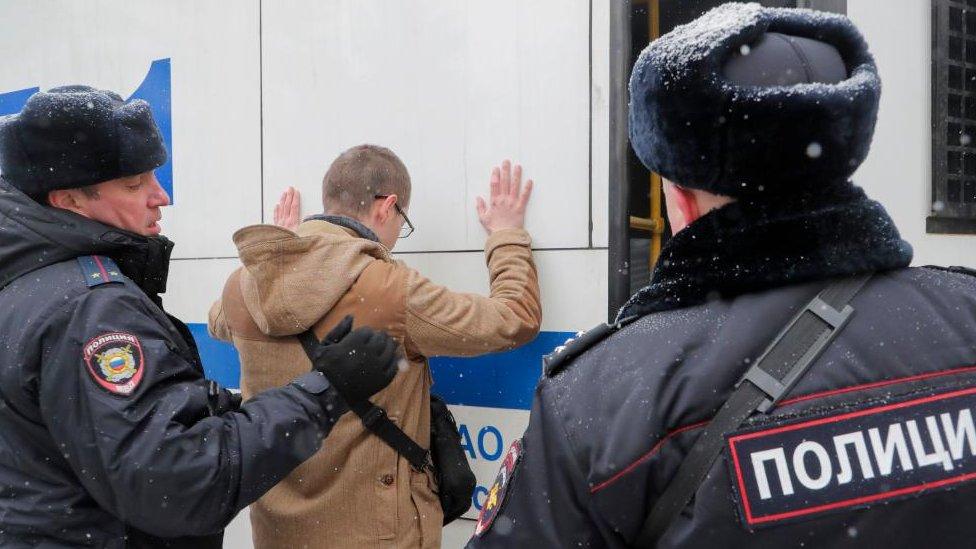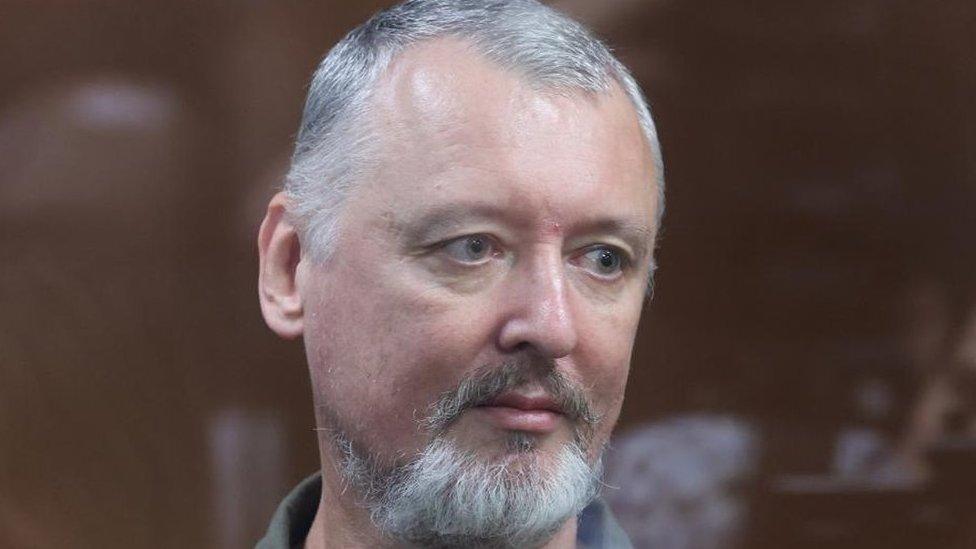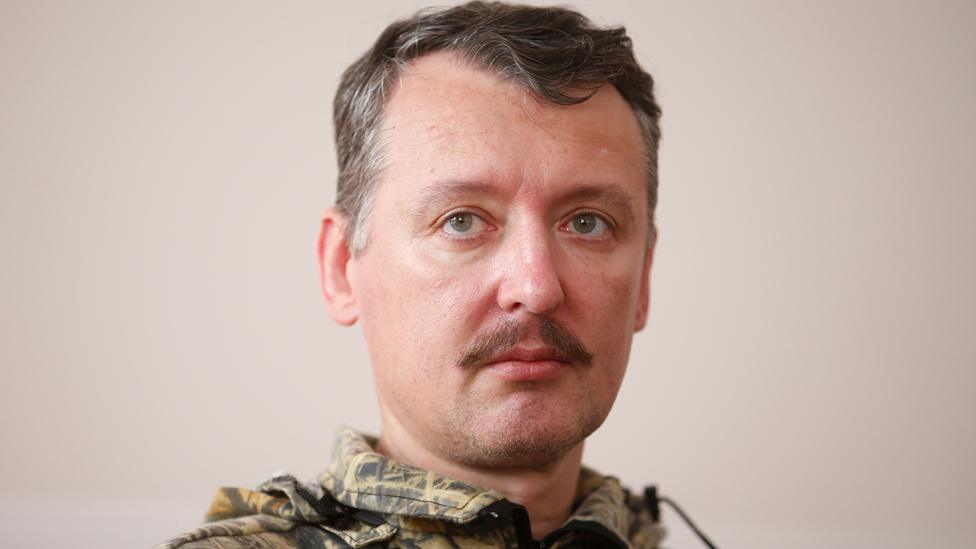Igor Girkin shot down a passenger jet, then insulted Putin. Which one put him in jail?
- Published

Igor Girkin has escaped justice for downing flight MH17 but is going to jail after criticising Vladimir Putin
The last time I saw Igor Girkin was five years ago in the stairwell of a Moscow news agency.
"Would you consider giving me an interview?" I asked. "No," he replied sharply and scurried away.
I saw him again today. No stairwell. This time, Girkin was in a caged dock surrounded by police in the Moscow City Court.
Along with other media we were allowed in to film him for just one minute before the end of his trial.
A police dog kept barking. Girkin found that amusing. The verdict less so. Minutes later he was found guilty on extremism charges and sentenced to four years in a penal colony.
This wasn't his first conviction.
In The Hague in 2022, in absentia, Girkin was found guilty of the murder of 298 people: the passengers and crew of Malaysian Airlines flight MH17.
The Boeing jet had been shot down over eastern Ukraine in 2014 by Russian-controlled forces in the early stages of Russia's war there.
Girkin was one of three men sentenced to life imprisonment. A judgement he ignored.
A year after we'd met in the stairwell, I managed to get through to Girkin on the phone and ask him about the Hague.
"I do not recognise the authority of the Dutch court on this matter," he told me.
"I am a military man and I am not going to accept that a civilian court in a foreign country has the authority to convict a person who took part in someone else's civil war, only because their civilians were killed.
"Do you know who shot down [the plane]?"
"The rebels didn't shoot down the Boeing. I have nothing more to say."
Russian rebel commander Igor Girkin told the BBC in 2020 he did not recognise the court's authority
"If it wasn't the rebels, then was it Russian soldiers?" I asked.
"That's it. Goodbye." He hung up.
Now he is going to prison. But not for mass murder. And not for life.
So, who exactly is Girkin - also known under his pseudonym as Igor Strelkov - and why has a Moscow court sent him to jail?
He is a former FSB officer in Russia's domestic security service. In 2014 he played a key role in the fighting in Ukraine's Donbas region: a conflict engineered and orchestrated by Moscow.
He organised and commanded pro-Russia militias in eastern Ukraine.
The Dutch court would later rule that Russia had been in control of the separatist forces fighting in eastern Ukraine and that Girkin had helped to bring the Buk missile system into Ukraine that was used to shoot down flight MH17.
Following Russia's full-scale invasion of Ukraine in 2022, ultranationalist Girkin became a prominent pro-war blogger.
He became increasingly critical of the way the Russian authorities were waging the war: not hard enough, in his view.
He founded a hard line nationalist movement called The Club of Angry Patriots.
His problems began when he started to take that anger out on President Vladimir Putin.
Public criticisms of the Russian president turned to insults. In a post last year, Girkin described Putin as "a non-entity" and "a cowardly waste of space".
A few days later he was arrested. Now he's been tried and convicted.
Of course, a four-year prison sentence is mild in comparison to other recent punishments delivered by Russian courts.
Last year pro-democracy activist Vladimir Kara-Murza was sentenced to a quarter of a century behind bars after being convicted of treason, a case he and his supporters insist was politically motivated.
How would the "Angry Patriots" react to Girkin's prison term? Would they pour on to the streets in protest?

Some of Girkin's supporters were detained outside the court in Moscow
Not exactly. A few dozen supporters gathered outside the Moscow City Court to chant "Freedom to Strelkov!" but there was little hint of optimism in their voices.
"They've put a Russian national patriot on trial," Denis tells me. "I hope our people wake up and fight. Unfortunately, we don't see much pushback. Everyone seems to be hiding away."
Also in the crowd was retired colonel and outspoken ultranationalist Vladimir Kvachkov.
Having informed me that "Russia will always be the enemy of the Anglo-Saxon West" and assured me that the break-up of the United Kingdom was inevitable, Mr Kvachkov claimed that Girkin was being punished for "fighting against the system."
In recent years the "system" concentrated on clearing the Russian political landscape of pro-democracy, pro-Western critics and challengers.
A prison sentence for Girkin suggests the Russian authorities have now decided to crack down on critics from the opposite end of the spectrum: the so-called ultra-patriots.
Last year's mutiny by Wagner mercenaries led by Yevgeny Prigozhin may be the reason.
The Putin system survived the challenge. But that drama will have alerted the Kremlin to the potential dangers from highly motivated nationalistic and patriotic elements in Russian society.
Related topics
- Published19 November 2023
![Photo of Igor Strelkov with caption that reads in Russian "Our president [is] Igor Ivanovich Strelkov'24](https://ichef.bbci.co.uk/ace/standard/976/cpsprodpb/94B2/production/_131766083_strelkov.jpg)
- Published21 July 2023

- Published9 March 2020
